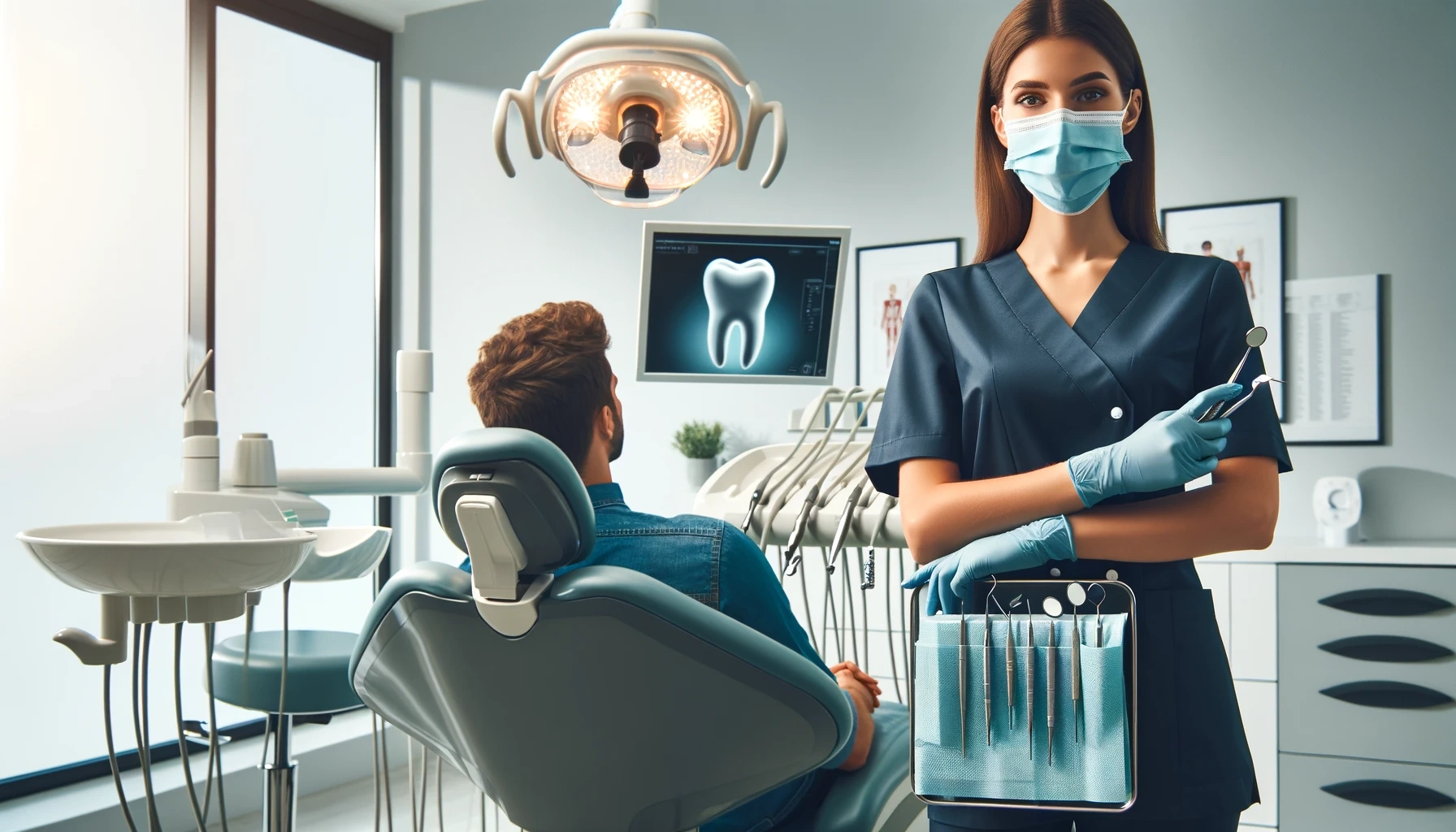Embarking on a dental hygienist career can be a rewarding journey with its share of challenges.
Aspiring dental hygienists face challenges from tough educational requirements to a competitive job market, seeking ways to ease their entry into the field.
This article explores various tips and strategies that can ease the path to a successful dental hygienist career.
Key Requirements for Becoming a Dental Hygienist
To become a dental hygienist, individuals must meet specific requirements, including education, licensing, and skills.
Here are the critical requirements for entering this rewarding profession:
- Education: Completion of an accredited dental hygiene program, typically at the associate’s level.
- Licensing: Passing the National Board Dental Hygiene Examination and a state or regional clinical exam.
- Skills: Strong interpersonal skills, attention to detail, and physical stamina for long periods of standing and working with patients.
- Continuing Education: Maintaining licensure through ongoing education and professional development requirements.
- State Regulations: Understanding and complying with state-specific regulations for dental hygienists.

Challenges Faced in Pursuing a Dental Hygienist Career
Pursuing a career as a dental hygienist comes with its own set of challenges. Here are some common obstacles that aspiring hygienists may encounter:
- Education Costs: Dental hygiene programs can be expensive, and students may struggle to afford tuition and related expenses.
- Competitive Job Market: Getting a job as a dental hygienist can be challenging, especially in areas with many dental professionals.
- Work-Life Balance: Dental hygienists often work long hours, and balancing work with personal responsibilities is challenging.
- Physical Demands: The job requires long periods of standing and working near patients, which can be physically demanding.
- Continuing Education: Dental hygienists need ongoing education for their license, which can be time-consuming and costly.
Tips to Make Dental Hygienist Careers Easier to Get Into
Embarking on a career as a dental hygienist can be made easier with the right strategies and tips.
Here are some tips to help you navigate your path to becoming a dental hygienist:
Networking in the Dental Hygiene Field
Networking is a vital aspect of advancing in the dental hygiene field. Here are key networking strategies to help you connect and grow professionally:
- Relationships: Connect with dental professionals for insights and opportunities.
- Social Media: Use platforms like LinkedIn for networking.
- Associations: Join dental hygiene groups for networking events.
- Education: Attend courses for networking and skill enhancement.
- Volunteering: Connect with professionals by volunteering at dental clinics.
Advanced Education Options for Dental Hygienists
Furthering your education with additional certifications and degrees can enhance your career prospects in dental hygiene.
Here are some options to consider:
- Bachelor’s Degree in Dental Hygiene: Provides advanced knowledge and skills, often required for teaching or public health positions.
- Master’s Degree in Dental Hygiene: Offers specialized knowledge and skills beneficial for research, teaching, or leadership roles.
- Advanced Dental Hygiene Practitioner (ADHP): Allows expanded practice, including limited restorative and preventive procedures.
- Registered Dental Hygienist in Alternative Practice (RDHAP): Allows independent practice in communities without direct supervision.
- Local Anesthesia Certification: Enables administration of local anesthesia for pain management during dental procedures.
Advanced education can open doors to teaching, research, or leadership roles in dental hygiene.
Volunteering Opportunities for Aspiring Dental Hygienists
Volunteering offers valuable hands-on experience, expands networks, and shows commitment to the field.
It can also enhance skills, such as patient communication and community outreach, that are highly valued in the dental hygiene profession.
Gaining Practical Experience and Making Professional Connections:
- Internships: Gain hands-on experience and build professional connections.
- Volunteering: Acquire practical experience and network with healthcare professionals.
- Continuing Education: Stay updated and connect with peers through seminars and workshops.
- Professional Organizations: Network at conferences and events by joining dental hygiene associations.
- Mentorship Programs: Receive guidance and networking opportunities from experienced professionals.

Job Shadowing in Dental Hygiene
Job shadowing is a valuable tool for exploring a career in dental hygiene. Here are the key roles that job shadowing plays in career exploration:
- Insight: Job shadowing offers firsthand experience of a dental hygienist’s daily tasks.
- Exposure: It familiarizes individuals with the clinic or office environment.
- Patient Interaction: Observing patient care helps gauge comfort levels.
- Networking: Shadowing provides opportunities to connect with dental professionals.
- Career Clarity: It helps clarify career goals through direct experience.
Job shadowing offers firsthand experience of a dental hygienist’s daily tasks and responsibilities.
Crafting an Effective Resume and Cover Letter
Crafting an effective resume and cover letter is crucial for showcasing your skills and experience in the competitive field of dental hygiene.
Here are key strategies to help you create compelling application materials:
- Tailoring Content: Customize your resume and cover letter to match the job requirements.
- Highlighting Achievements: Use quantifiable achievements to showcase your skills and contributions.
- Using Keywords: Incorporate relevant keywords from the job description.
- Formatting: Use a clean, professional format with consistent formatting.
- Proofreading: Thoroughly proofread to avoid typos and errors.
Interview Preparation Tips
Preparing for a dental hygienist job interview is crucial for making a positive impression on potential employers.
Here are vital tips to help you prepare effectively:
- Research the Practice: Familiarize yourself with the dental practice and its values.
- Practice Common Questions: Rehearse answers to typical interview questions.
- Highlight Your Qualifications: Emphasize relevant skills and experiences.
- Dress Professionally: Choose professional attire.
- Arrive Early: Aim to arrive 15 minutes before the interview.
- Bring Necessary Documents: Carry copies of your resume, certifications, and other relevant documents.
- Be Prepared to Discuss Specific Cases: Discuss patient cases or scenarios pertinent to the job.
Continuing Education Opportunities
Staying updated with advancements in dental hygiene is crucial for providing the best possible care to patients.
It also demonstrates a commitment to professional growth and development.
Continuing Education in Dental Hygiene:
- Seminars and Workshops: Attend to learn about the latest trends and techniques.
- Online Courses: Enhance your skills and knowledge remotely.
- Webinars: Stay updated on relevant topics.
- Conferences: Network, learn from leaders, and explore new technologies.
- Certification Programs: Expand your skill set and career opportunities.
Professionalism in the Dental Hygiene Profession
Maintaining professionalism is crucial in dental hygiene, as it reflects the high standards of care expected by patients and colleagues.
Here are vital aspects of professionalism in dental hygiene:
- Appearance: Maintain a professional appearance by wearing clean and appropriate attire.
- Communication: Communicate clearly and respectfully with patients and colleagues.
- Ethics: Uphold ethical standards and practice within the scope of your licensure.
- Time Management: Manage your time effectively to ensure timely and efficient patient care.
- Continuous Learning: Stay updated with advancements in the field through continuing education.
- Collaboration: Collaborate with other healthcare professionals to provide comprehensive care to patients.
- Respect: Treat patients and colleagues with respect, regardless of differences.
- Confidentiality: Maintain patient confidentiality in all aspects of care.
- Accountability: Take responsibility for your actions and decisions in patient care.
- Professional Development: Engage in ongoing professional development to enhance your skills and knowledge.
Summing It Up
In conclusion, these tips can ease the path to a successful dental hygienist career.
Networking, gaining experience, and enhancing professionalism are vital strategies for standing out in a competitive job market.
By using these tips and staying committed to growth, individuals can increase their chances of a fulfilling career in dental hygiene.
Read in another language
- Español: ¿Estos consejos facilitan la entrada a las carreras de higienista dental?
- Bahasa Indonesia: Apakah Tips Ini Membuat Karir Higienis Gigi Menjadi Lebih Mudah Diperoleh?
- Bahasa Melayu: Adakah Tip-Tip Ini Memudahkan Anda Untuk Menjalani Kerjaya sebagai Jururawat Gigi?
- Čeština: Zjednoduší tyto tipy získání práci dentální hygienistky?
- Dansk: Gør disse tips det lettere at komme ind i tandplejeassistent karrierer?
- Deutsch: Machen diese Tipps den Einstieg in die Berufe als Dentalhygieniker einfacher?
- Eesti: Kas need näpunäited teevad hambaarsti karjääri alustamise lihtsamaks?
- Français: Est-ce que ces conseils facilitent l’accès aux carrières d’hygiéniste dentaire?
- Hrvatski: Da li Vam ovi savjeti olakšavaju ulazak u karijeru dentalnog higijeničara?
- Italiano: Rendono più facile accedere alla carriera di igienista dentale questi suggerimenti?
- Latviešu: Vai šie padomi atvieglo zobārsta higiēnista karjeras iespēju iegūšanu?
- Lietuvių: Ar šie patarimai palengvina įsikūrimą dantų higienisto karjeroje?
- Magyar: Segítenek ezek a tippek könnyebbé tenni a fogorvosi higiénikus karrierbe való bekerülést?
- Nederlands: Maken deze tips het gemakkelijker om een carrière als tandartsassistent te starten?
- Norsk: Gjør disse tipsene det lettere å få seg inn i tannpleiekarrierer?
- Polski: Czy te wskazówki ułatwiają zdobycie pracy higienistki stomatologicznej?
- Português: Estas Dicas Tornam Mais Fácil Entrar em Carreiras de Higienista Dental?
- Română: Fac aceste sfaturi mai ușoare pentru a intra în carierea de igienist dentar?
- Slovenčina: Či tieto tipy uľahčujú získanie práce zubnej hygieničky?
- Suomi: Tekevätkö nämä vinkit hammaslääkärin uran aloittamisen helpommaksi?
- Svenska: Gör dessa tips tandhygienistkarriärer lättare att komma in i?
- Tiếng Việt: Các Mẹo Này Có Giúp Việc Thể Hiện Nghề Nghiệp Làm Răng Miệng Dễ Dàng Hơn Không?
- Türkçe: Bu İpuçları Diş Hekimliği Hijyenist Kariyerine Girmeyi Daha Kolay Hale Getiriyor mu?
- Ελληνικά: Αυτές οι συμβουλές κάνουν την είσοδο στην επαγγελματική σταδιοδρομία ως οδοντικό υγιεινό να πραγματοποιηθεί πιο εύκολα;
- български: Дали тези съвети правят по-лесно влизането в кариерата на зъболекарска хигиенистка?
- Русский: Делают ли эти советы профессию стоматологического гигиениста более доступной?
- српски језик: Да ли ове савети олакшавају улазак у каријеру денталног хигијенисте?
- עברית: האם העצות הללו עוזרות למקלטים בתחום האורדניקה להיכנס?
- اردو: کیا یہ ٹپس دندان سازی ہائجینسٹ کیریئر میں داخلے کو آسان بناتی ہیں؟
- العربية: هل تجعل هذه النصائح الحصول على وظائف أخصائيي الصحة السنية أسهل؟
- فارسی: آیا این نکات باعث میشوند شغل هایوند ایجاد بهداشت دهان راحتتر شود؟
- हिन्दी: क्या ये टिप्स दंत स्वास्थ्य देखभाली व्यवसाय में प्रवेश प्राप्त करने को आसान बना देते हैं?
- ภาษาไทย: คำแนะนำเหล่านี้จะช่วยให้การเข้าสู่วงการทำงานในสาขาทันตกรรมดูง่ายขึ้นหรือไม่?
- 日本語: 歯科衛生士のキャリアに入るのが簡単になるこのヒントを実行すると、役立ちますか?
- 简体中文: 这些建议是否能让牙科卫生师职业更容易进入?
- 繁體中文: 這些建議有助於更容易進入牙齒保健師職業嗎?
- 한국어: 이 가이드들이 치과 위생사 직업에 더 쉽게 진입할 수 있도록 하는가요?







